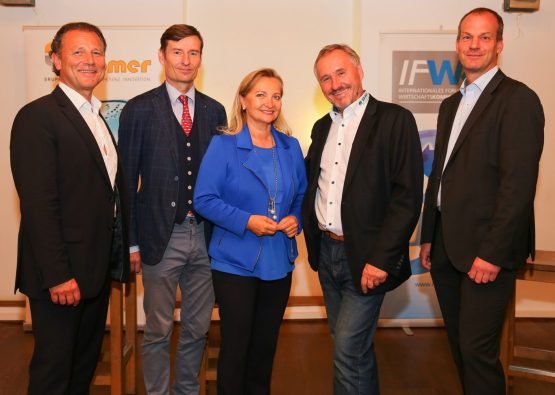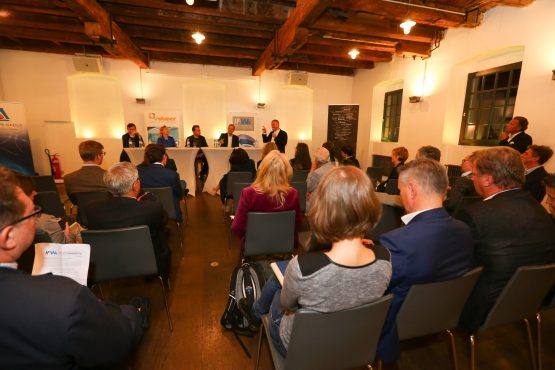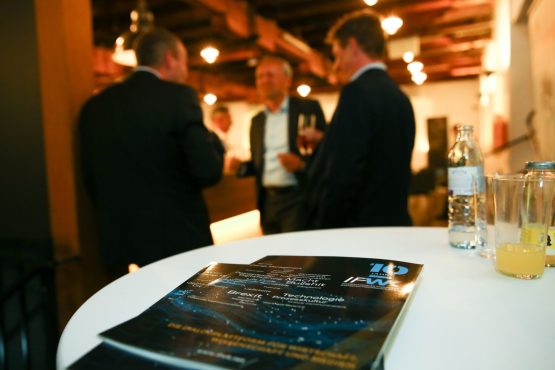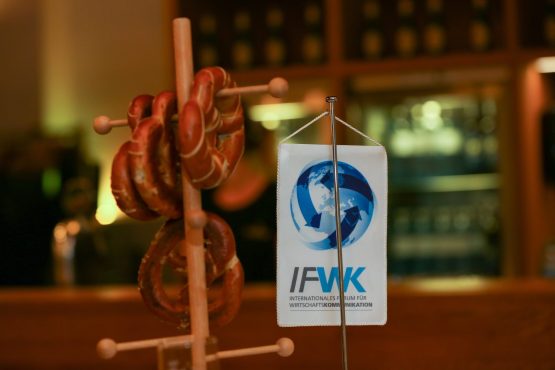Rabmer at the panel discussion "Water soon to be more valuable than oil?"
Water could soon be more valuable than oil - at least in some regions of the world. In principle, Austria has sufficient reserves, but the regional availability and, above all, the consumption of hot water must be critically scrutinized, while there is no need to worry about securing water rights. These were some of the key findings of an expert discussion in Vienna hosted by the International Forum for Business Communication (IFWK): Ulrike Rabmer-Koller, CEO of the Rabmer Group, and Otto Roiss, Managing Director of the Bauer Group, discussed with Professor Jörg Krampe from Vienna University of Technology and the Managing Director of Vöslauer Mineralwasser GmbH, Herbert Schlossnikl, under the direction of science journalist Martin Kugler (Universum Magazin, Die Presse). The panel agreed with IFWK founder Rudolf J. Melzer that technological innovations in water utilization and wastewater treatment should be used more intensively in the future.
Two billion people worldwide have to live with drinking water that is contaminated with faeces and therefore poses a massive health risk. Half of humanity will be living in regions with "water stress" by 2025 - in other words, with acute water shortages in some cases. Countries in Africa, the Middle East, China and India are the most affected. With these alarming figures, science editor Martin Kugler showed how privileged Austria (still) is in terms of water supply.
Quality and distribution as a challenge
Opinions were divided on the podium when it came to the question of whether water was really in short supply. "Water is definitely not scarce. - We have enough of it in our country in particular, and according to a study by the ÖVGW and BMNT, the expected consequences of climate change for the water cycle are manageable for water management in Austria from today's perspective," clarified Professor Jörg Krampe, Head of the Institute for Water Quality and Resource Management at TU Wien. The quality is also excellent, as Austria can obtain 100% of its drinking water from groundwater reserves.
People in this country only actually use 1% of the water available each year. However, according to Krampe, there is a massive distribution and quality problem in other parts of the world. The expert sees microplastic pollution, organic trace substances from medicines in wastewater and antibiotic resistance in water as major challenges in our latitudes in the future.
Water often a political issue
"There is enough water in this world," confirmed Otto Roiss, Managing Director of the Bauer Group, which is active worldwide with sustainable irrigation technology and systems for waste water management. The challenge lies in having water of the right quality available in the right place at the right time, according to Roiss. "While many regions and Western and Northern Europe have an abundance of water, continental regions in Asia or the Middle East have far too little of it, and when they do, it is of poor quality. Rivers and groundwater sources are being unbalanced by excessive extraction - and political conflicts often threaten resources. In the Middle East, oil is actually cheaper than water," says Roiss, describing the different conditions. 90% of the water is used in agriculture, sometimes using outdated methods such as flood irrigation, which consume several times the actual demand. "With modern mechanical irrigation, 50% of the water can be saved - in some cases far more," emphasizes Roiss.
Structural measures often make sense
Entrepreneur Ulrike Rabmer-Koller, CEO of the Rabmer Group, does indeed see the risk of water shortages increasing in our latitudes. Climate change is also becoming a major challenge in Europe and the USA: "The dry summers of recent years have severely affected agriculture in parts of Upper and Lower Austria, for example, which will lead to an increased need for irrigation capacity in the future. In addition, more and more water is being used in urban areas. Water is already scarce in some regions, and availability must be secured through costly investments in piping systems," she points out the development and appeals for conscious use of water as a resource and for countermeasures to be taken at a technical level: for example, by renovating existing water pipes on a large scale to counteract water losses caused by leaks or by saving water and energy for hot water preparation in private households when showering. The entrepreneur also advocates thinking more intensively about two separate water circuits (drinking water and service water) and promoting storage systems for rainwater such as infiltration trenches in parking lot management.
"No danger of selling off water in Austria"
Agriculture uses the most water - but consumers of mineral water have the highest quality awareness. The heyday of export water from other countries is over, states Herbert Schlossnikl, Managing Director of Vöslauer Mineralwasser GmbH, for his industry. And he sees a clear trend back towards glass bottles: "We relaunched the returnable glass bottle a few years ago and are seeing a sharp rise in demand. Our second line is the PET bottle made from 100% recycled material, which is significantly lighter and, above all, unbreakable. According to recent studies, this PET bottle is even more environmentally friendly than the glass bottle."
Sensitivity required for "water-intensive" products
Schlossnikl does not see the political danger of water being sold off in Austria. "The water law consensus, which is a matter for the federal states, provides a clear framework - also for mineral water extraction. The springs must be protected, only as much water may be extracted as can be replenished, and the interests of other users must not be impaired."
Such clear regulations do not exist in many regions of the world, for example in Central Africa and the Middle East, Otto Roiss noted critically.
There was agreement among the panelists that awareness of the importance of healthy drinking water has increased. However, people are less aware that it is also important to conserve the resources around us. For example, the production of meat or jeans is extremely water-intensive, said water expert Krampe from the Vienna University of Technology. There are many ways to counteract this.
Participants in the lively public discussion on the hop floor of the Ottakringer brewery included: Lenzing Director Waltraud Kaserer, chartered accountant Richard Kohlhauser, ORF business editor Katinka Nowotny, TU Professor Helmut Kroiss, Esteé Lauder Manager Marion Pelzel, Christine Perkonigg, Corporate Communication Manager of Bacher Systems EDV GmbH, ROMA Marketing Manager Roland Bürger, as well as IFWK founding members Peter Muzik, Walter Weihs and Klaus Schmid.
Images and text provided by the International Forum for Business Communication.
Melzer, Schlossnikl, Rabmer, Roiss, Krampe



